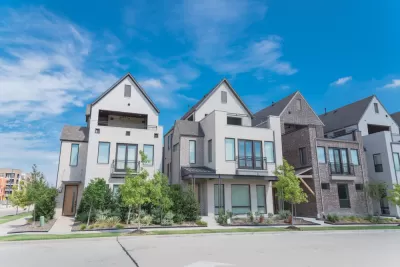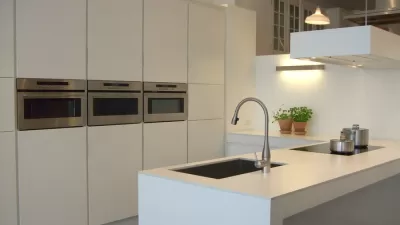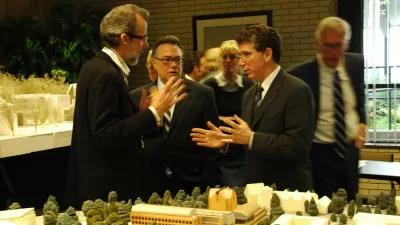Mass-market production and the commodification of housing has led to a ‘flattening’ of design into a limited set of bland, homogeneous options.

In a piece for the Dallas Morning News, architecture critic Mark Lamster describes what he calls “The Flattening” of American culture, wherein products such as cars and houses that once featured unique designs are increasingly similar to each other.
Lamster writes, “To drive around Dallas (or any American city) is to be confronted by an endless series of cheaply constructed apartment blocks, three to five stories in height, with clunky beige bays that stretch for blocks on end.” To Lamster, this sameness is “an insult to the art” of architecture.
This homogeneity, according to Lamster, boils down to “a conservatism inherent in American culture,” an ethos that is “inherently risk averse.” Meanwhile, a disconnection from the house as a “multigenerational homestead” and its transformation to a commodity encourages builders to try to appeal to as wide an audience as possible with inoffensive, bland designs and cheap, readily available materials.
Not leaving out the workplace, Lamster also critiques the modern office tower, which “has likewise become a cliche repeated ad nauseum.” Modern design, Lamster argues, “is almost entirely driven by economics.”
The drive to maximize short-term profit pervades all aspects of society, Lamster argues, recommending “a shift in economic policy” that would “incentivize long-term profit over quarterly growth,” although Lamster admits he doesn’t have a suggestion for what this shift would entail. However, the ravages of climate change, which threaten our complacent bubble, could force the kind of broad change required to snap us out of the comfortable, but bland, status quo.
FULL STORY: Why does everything look the same in North Texas? Blame the ‘flattening’

Maui's Vacation Rental Debate Turns Ugly
Verbal attacks, misinformation campaigns and fistfights plague a high-stakes debate to convert thousands of vacation rentals into long-term housing.

Planetizen Federal Action Tracker
A weekly monitor of how Trump’s orders and actions are impacting planners and planning in America.

Chicago’s Ghost Rails
Just beneath the surface of the modern city lie the remnants of its expansive early 20th-century streetcar system.

Bend, Oregon Zoning Reforms Prioritize Small-Scale Housing
The city altered its zoning code to allow multi-family housing and eliminated parking mandates citywide.

Amtrak Cutting Jobs, Funding to High-Speed Rail
The agency plans to cut 10 percent of its workforce and has confirmed it will not fund new high-speed rail projects.

LA Denies Basic Services to Unhoused Residents
The city has repeatedly failed to respond to requests for trash pickup at encampment sites, and eliminated a program that provided mobile showers and toilets.
Urban Design for Planners 1: Software Tools
This six-course series explores essential urban design concepts using open source software and equips planners with the tools they need to participate fully in the urban design process.
Planning for Universal Design
Learn the tools for implementing Universal Design in planning regulations.
planning NEXT
Appalachian Highlands Housing Partners
Mpact (founded as Rail~Volution)
City of Camden Redevelopment Agency
City of Astoria
City of Portland
City of Laramie





























